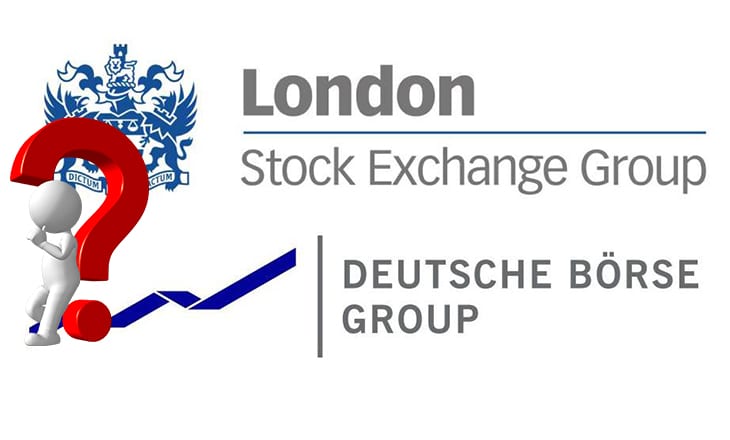The European Commission has prohibited the proposed merger between Deutsche Börse AG and London Stock Exchange Group under the EU Merger Regulation. The Commission’s investigation concluded the merger would have created a de facto monopoly in the markets for clearing fixed income instruments.
The proposed merger would have combined the activities of the two largest European stock exchange operators, Deutsche Börse AG (DBAG) and London Stock Exchange Group (LSEG). They own the stock exchanges of Germany, Italy and the United Kingdom, as well as several of the largest European clearing houses.

Margrethe Vestager
Commissioner Margrethe Vestager, in charge of competition policy, said:
The European economy depends on well-functioning financial markets. That is not just important for banks and other financial institutions. The whole economy benefits when businesses can raise money on competitive financial markets.
The merger between Deutsche Börse and the London Stock Exchange would have significantly reduced competition by creating a de facto monopoly in the crucial area of clearing of fixed income instruments. As the parties failed to offer the remedies required to address our competition concerns, the Commission has decided to prohibit the merger.
The complete European Commission announcement reads as follows:
The Commission’s concerns
The merger would have led to a de facto monopoly in clearing of fixed income instruments (bonds and repurchase agreements) in Europe, where the parties are the only relevant providers of these services. In particular, the merger would have combined DBAG’s Frankfurt based clearing house Eurex with LSEG’s clearing houses LCH.Clearnet (which comprises London based LCH.Clearnet Ltd and Paris based LCH.Clearnet SA) and Rome based Cassa di Compensazione e Garanzia.
This monopoly in clearing fixed income instruments would also have had a knock-on effect on the downstream markets for settlement, custody and collateral management. Service providers in these markets depend on transaction feeds from clearing houses. As DBAG’s Clearstream competes with these service providers, the merged entity would have had the ability and the incentive to divert transaction feeds to Clearstream and foreclose the other competitors.
In addition, the merger would have removed horizontal competition for the trading and clearing of single stock equity derivatives (based on stocks of Belgian, Dutch and French companies). Currently, Eurex competes with a bundled product (combining trading and clearing) offered by Euronext and LCH.Clearnet SA. After the merger, LCH.Clearnet, which has significant pricing power over the bundled product, would have less incentive to compete with Eurex. Finally, this market power could potentially also be used to squeeze out Euronext.
The Commission raised these concerns in its decision to open an in-depth investigation and communicated them formally to the parties in a Statement of Objections issued in December 2016. The Commission also raised further preliminary competition concerns on which it eventually did not have to conclude.
It is the responsibility of the parties to address competition concerns either by rebutting them or by proposing adequate remedies. To be effective, remedies have to address all of the Commission’s competition concerns and be viable long-term.
The parties’ proposed remedy
The parties proposed a remedy consisting of the divestment of LCH.Clearnet SA, LSEG’s France-based clearing house to address the Commission’s concerns.
The Commission concluded that this divestment would have resolved the concerns relating to single stock equity derivatives. However, it would not have been effective to remedy the concerns stemming from the creation of the de facto monopoly in fixed income clearing. This is what emerged from the market test of the remedy. Market testing is the phase of a merger investigation during which the Commission consults on proposed remedies with market participants to allow them to submit their views.
The market test revealed that LCH.Clearnet SA’s fixed income clearing business is vitally dependent on trading feeds from LSEG’s fixed income trading platform MTS. Without these trading feeds, the viability of this business line in the future would be severely undermined. Therefore, the Commission could not determine whether LCH.Clearnet SA would have been a viable competitor in fixed income clearing going forward.
The parties have had the opportunity to modify the proposed commitments to address the issues identified during the market test. The divestment of MTS, a comparatively small asset compared to the parties’ combined revenues and market value, would have been a clear-cut remedy to meet these concerns.
Ultimately, the parties were, however, only prepared to offer a complex set of behavioural measures but not the divestiture of MTS. They were not able to demonstrate that these measures would have been effective in practice and would have ensured that LCH.Clearnet SA would be a viable competitor in fixed income clearing going forward.
The Commission therefore concluded that the proposed remedy would not have been able to prevent the emergence of a de facto monopoly on the markets related to fixed income clearing as a result of the merger, which is why it decided to block the proposed transaction.
Companies and products
Deutsche Börse AG is a diversified financial market infrastructure organisation, best known for operating the Frankfurt Stock Exchange, a regulated marketplace for trading stocks, bonds and various other financial instruments. It also operates other regulated exchanges, most notably Eurex and the European Energy Exchange (EEX), where various types of derivative products are traded. Apart from trading, its activities include the supply of post-trade infrastructure services such as clearing, settlement and custody services, as well as market data, indices and other information products.
London Stock Exchange Group is also a diversified financial market infrastructure organisation, best known for operating the London Stock Exchange. It also owns Borsa Italiana, the Italian stock exchange, and operates a number of other trading platforms for trading of stocks, other equity-like exchange traded products, bonds and derivatives. LSE is also active in the post-trading space, most notably in clearing through the London Clearing House (also referred to as LCH.Clearnet) including SwapClear, and Cassa di Compensazione e Garanzia (CC&G), the Italian clearinghouse. LSE also offers settlement and custody services as well as indices, data, and other information products.
Merger control rules and procedures
The Commission has the duty to assess mergers and acquisitions involving companies with a turnover above certain thresholds (see Article 1 of the Merger Regulation) and to prevent concentrations that would significantly impede effective competition in the EEA or any substantial part of it.
The vast majority of notified mergers do not pose competition problems and are cleared after a routine review. From the moment a transaction is notified, the Commission generally has 25 working days to decide whether to grant approval (Phase I) or to start an in-depth investigation (Phase II).
There are currently two on-going phase II merger investigations:
- the proposed acquisition by HeidelbergCement and Schwenk of Cemex Croatia
- the proposed acquisition of Syngenta by ChemChina.
